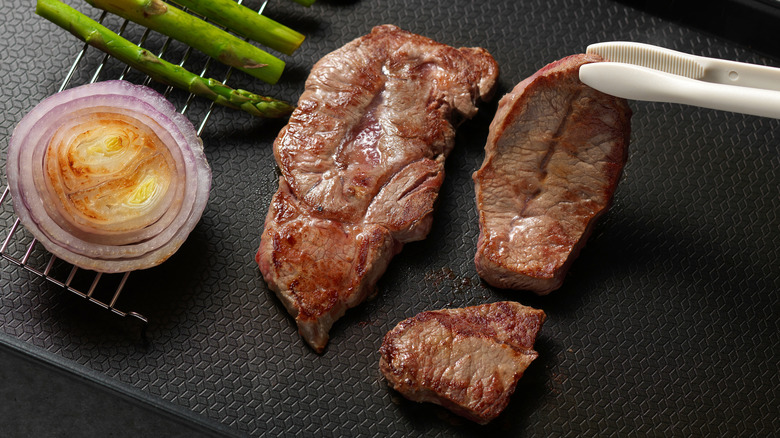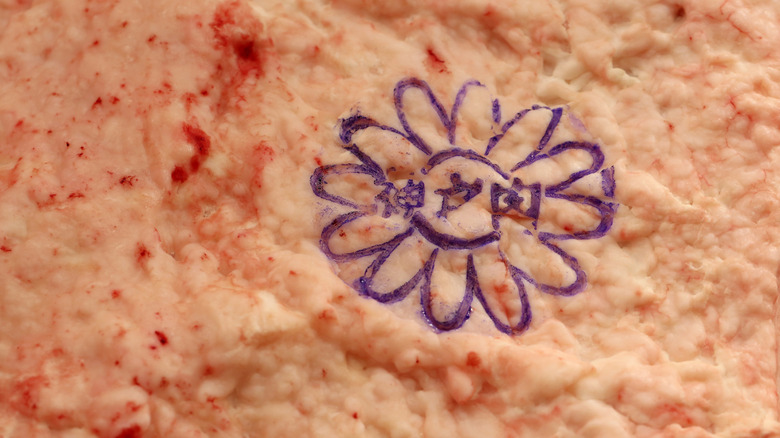The Kobe Beef Red Flag That Could Mean It's Fake
Fascinating chefs and diners worldwide, Kobe beef is an extremely sought-after meat known for its rich marbling and flavor, as well as its mouth-watering tenderness. The rarity of and demand for this steak have resulted in counterfeit Kobe beef appearing in stores and on restaurant menus. When the meat is missing its official stamp, that's a major red flag that it's fake.
Only raised in the Hyogo Prefecture of Japan, real Kobe beef is very hard to find in the U.S., because of the Hyogo government's breeding restriction laws. These limit production to just 3,000 to 4,000 cows per year, only a small portion of which make it to the States. Authentic Kobe will bear the official Nojikiku stamp. This trademark of a Japanese chrysanthemum (the flower of Hyogo Prefecture) is typically stamped on the meat in a bluish, purplish color with three Japanese characters inside of it that mean "Kobe meat." The stamp has been used in the U.S. since August 2014.
However, you may encounter another trademark that has been used in the States just as long. It's a stamp of Hyogo Prefecture's flag with three Japanese characters underneath. These stand for "Tajima-gyu," a reference to beef coming from the Tajima strain of Wagyu cattle in Japan. In the same way that Kobe and Wagyu aren't interchangeable terms – as Kobe meat is a type of Wagyu beef – Kobe and Tajima aren't interchangeable, either, since Kobe is a designation of the highest quality of Tajima meat. As a result, beef with this trademark isn't Kobe meat.
Other ways to confirm the authenticity of Kobe beef
With Kobe being one of the most expensive cuts of steak you can buy because of its limited availability and quality, you don't want to end up with a fake. Fortunately, the official trademark stamps aren't the only way to tell whether or not Kobe beef is authentic. Another is to check the Kobe Beef Marketing & Distribution Promotion Association's guide to see if the store or restaurant where you're getting the meat is registered to sell it.
As of 2025, three dozen companies are registered to sell Kobe beef at wholesale in the U.S., while 31 are registered for retail sale — a vast change since 2016, when no retail sales were available. There are also more than 100 restaurants registered to serve diners Kobe beef — also a significant increase from 2016. If a store or restaurant says that its meat is of Kobe quality but you can't find it on this list, then you know it's fake.
Another way to confirm the authenticity of Kobe meat that you're buying at the store is to search for its individual ID number in the Tajima Beef Certification System. All Kobe-certified carcasses are issued a Kobe Meat Certificate, and each cut that you purchase at retail should be designated with the associated 10-digit number. If you're ordering Kobe beef at a restaurant, though, another way to determine whether or not it's fake is to look for a small, bronze statuette. All restaurants, retailers, and wholesalers can display this symbol of authenticity in their shop fronts.

